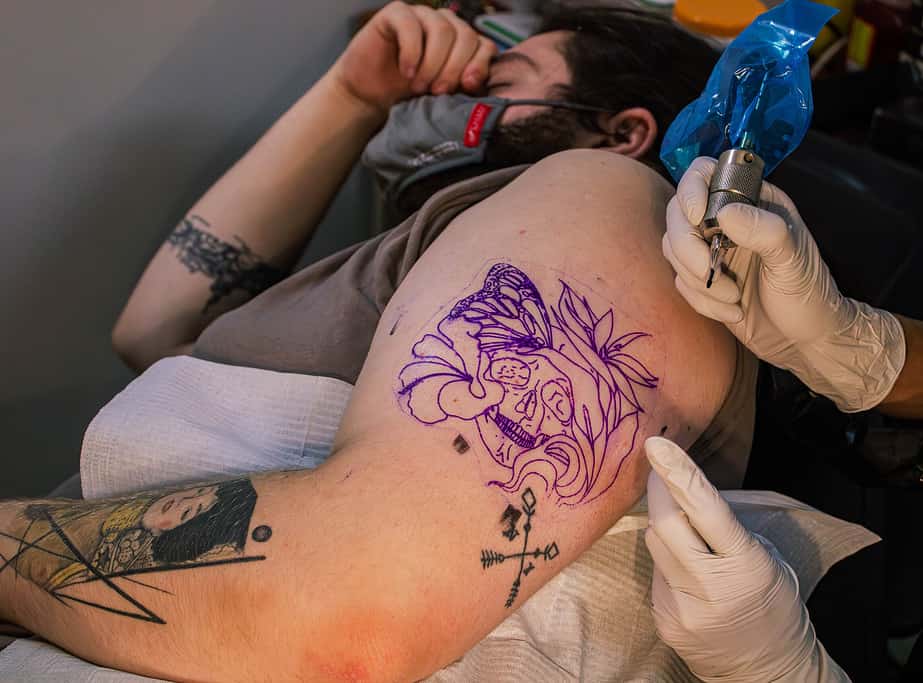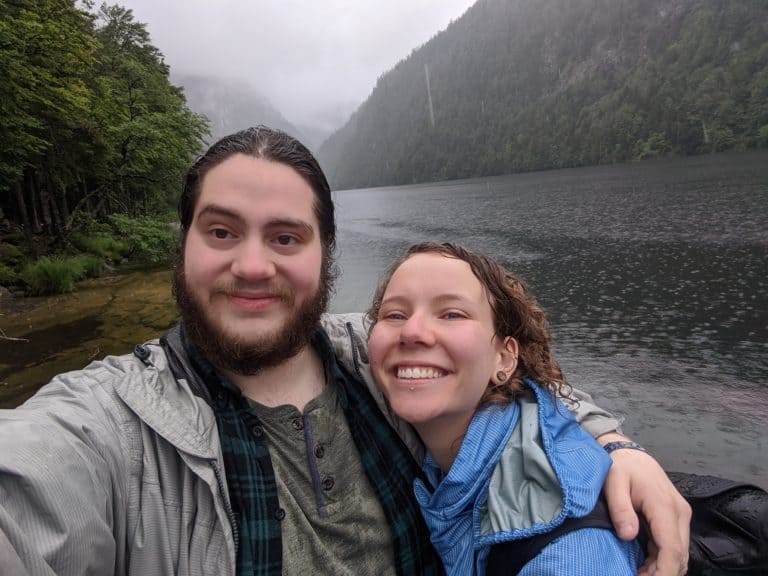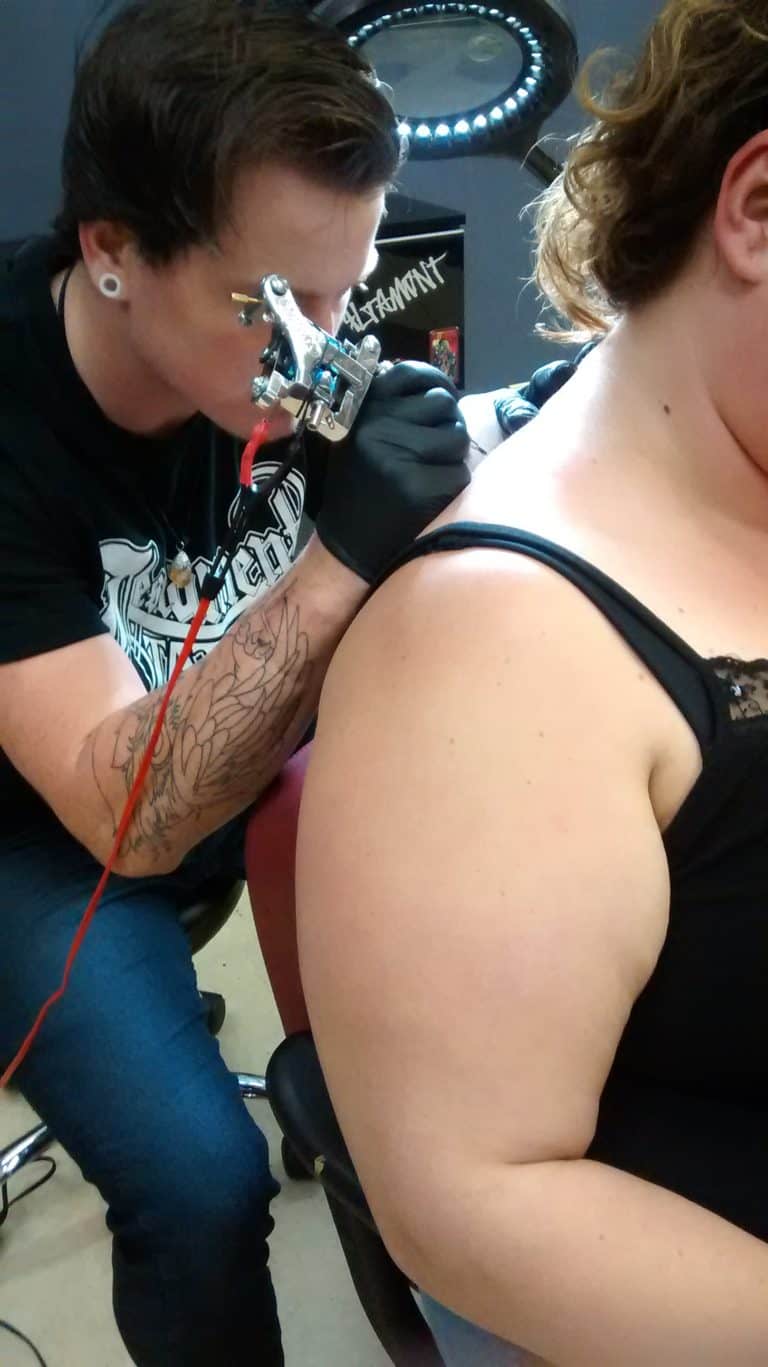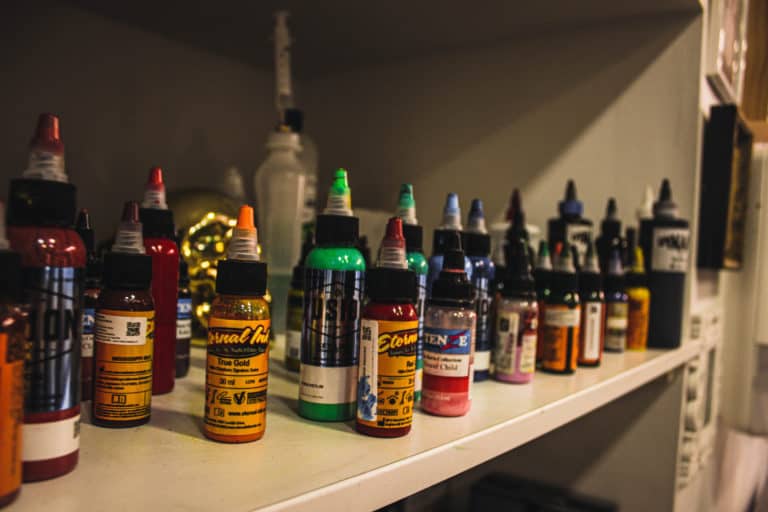Contents of Post

If you’ve spent a lot of time around people who are heavily tattooed, then it’s possible you’ve heard the term “tattoo therapy” once or twice. Perhaps it made sense to you at the time, but later seemed a bit weird. Maybe you found yourself thinking, “What the hell is tattoo therapy?” Yet you were too scared to ask at the time.
Then again, maybe it made perfect sense to you. Though, if that’s the case, I’m not entirely sure why you’re here. Either way, it never hurts to ask. Unless it’s something that tattoo artists hate hearing.
So, What Is Tattoo Therapy?
Like almost everything regarding mental health, there is no “one size fits all” answer. Tattoo therapy can mean completely different things depending on who is saying it. Although I will do my best to cover all the bases, there’s still a chance that someone reads this and thinks, “Yeah, that’s not at all what I mean.”
It’s quite possible that I may miss something. After all, I am only human. Let’s see if by the end you can guess how I mean it.
Pain Can Be Therapeutic
When a person experiences pain, the brain releases a myriad of chemicals to dull the pain. Some of those chemicals include serotonin, norepinephrine, and endogenous opioids such as endorphins. The release of these chemicals can sometimes trigger dopamine to be released, leading to even more feelings of relief.
For some, the chemicals released don’t end at dulling or relief from pain. They can have the ability to create a sense of pleasure or euphoria. Sometimes even going as far as to create a feeling of being high.
For people who have a hard time dealing with or processing emotions, that pain can be a physical release to an emotional pain they feel. In fact, it’s a very similar reason as to why some people cut. From my experience, this meaning of tattoo therapy is quite common in those who did cut when they were younger.
Tattoo therapy is, at times, talking about the flooding of chemicals and endorphins. That dulling or pain, the release, the pleasure, euphoria, or the high that one experiences while getting tattoos.
Reclaiming Your Body & Gaining Confidence
Sometimes horrible things happen that leave people maimed, scarred, or disfigured. Sometimes that’s physical, others mental. For some, tattoos are a way of reclaiming their body. A way to cover all those scars is by either literally covering them or by getting an image to depict an inner scar.
Reclaiming your body through art that you love can be empowering. It can be a way of celebrating how far you’ve come in your journey. A way to symbolize how hard you’ve fought against adversity. All of which can be immensely therapeutic.
For some, that is what tattoo therapy is all about. The reclamation of one’s body, a way of gaining, or regaining, self-confidence, a way of showing how far one has come. It can even provide the closure one has been searching for. Mental Health tattoos have become a huge thing in modern culture.
Commemorating Loss
One of the most prevalent types of tattoos in recent history has been the memorial tattoos. It’s been a common form of coping with the loss of loved ones to get a tattoo. Quite often it’s the date of death or the date of birth and death. It’s also fairly common that the date might be paired with a small image. One that reminds them of their lost loved one.
However, once in a while, people will get a gorgeous, elaborate piece of art. A memorial piece that they add onto for years to come. Either just for that one person or for anyone else who passes.
Whichever method of commemorating their loved ones they go by, it helps them. It’s how they chose to heal and to them, that tattoo could be the ultimate form of therapy.
Therapeutic Approaches To Tattooing
Although rare, a few tattoo artists will take various therapeutic approaches to their tattooing. Although I doubt this is what many mean when they talk about tattoo therapy, it’s also taking that idea to the next level.
I have never been to one myself and therefore can’t speak to the validity of it. However, I have heard from friends of places that will incorporate various techniques into the tattooing process. I’ve heard of guided meditation, Reiki, and breathing exercises being used. Honestly, sometimes just being able to open up to your artist and talk about things is in itself helpful.
Combining Tattoos and Therapy
Back in 2014, Spike TV combined these two things in the most fascinating of ways. That combination was the basis of the TV special “Ink Shrinks”. A special that many thought would end up being its own series, but was perhaps a bit ahead of its time.
Ink Shrinks was both about overcoming fear and emotional healing. The premise was fascinating. Teams made up of a psychologist and a tattoo artist would work together to make a tattoo for their client. It would start with the client having a long session with the psychologist. They would go over some stuff, which the psychologist would then keep in mind as they went to work with the artist.
The artist and psychologist would work together on designing a fitting tattoo for the client in secret. The client would then go and get that tattoo inscribed upon their body. Yet the kicker was that they couldn’t see the tattoo until it was done.
I could see how that would make good television. However, I can also see how that could be petrifying. However, seeing as it was a television show, the clients knew what they were getting into.
Tattoo Therapy In A Nutshell
What tattoo therapy means depends on who is saying it. It means different things to different people. Perhaps you’ll find yourself saying it sometime in the not-so-distant future.
That being said, the next time that you hear someone talk about tattoo therapy, you’ll have a decent idea of what they are talking about. If only the generic concept. Perhaps they mean one of the things listed above, but perhaps I’m way off base. It could be something wildly different. Yet, you’ll know they find it therapeutic.
If you want to know more specifically what it means to some, then ask. Most people won’t have an issue sharing; if they do, they’ll probably be polite about saying so.
As always, we believe we should live with intention, travel with purpose, and let the world inscribe its stories upon us.
So until next time, stay authentic, stay Nomadic, and let the world inscribe its stories upon you more than you do upon it.




